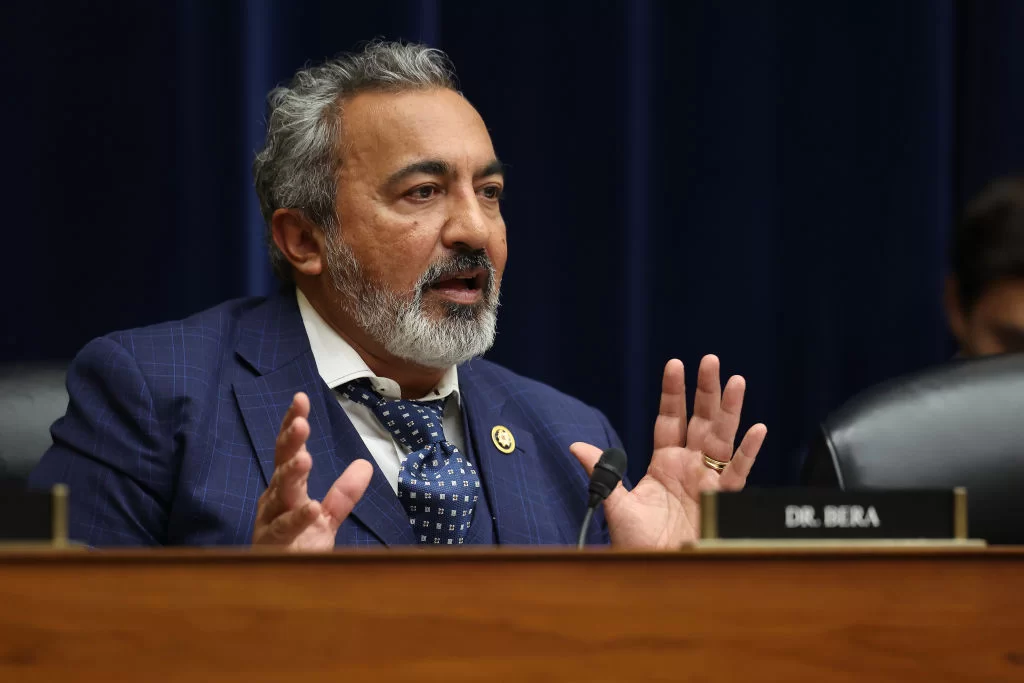- Monday, May 12, 2025
Indian-American Congressman Ami Bera calls for active US engagement in defusing India-Pakistan tensions, warning against the Trump administration’s disengagement and advocating for broader cooperation with Arab states and long-term peace efforts.

By: Vibhuti Pathak
Amid rising tensions between India and Pakistan, Indian-American Congressman Ami Bera has emphasized the critical role of the United States in diffusing the conflict and steering both nations towards a ceasefire.
Speaking to Indian media ahead of the formal announcement of a ceasefire, Bera, a senior member of the Intelligence Committee of the US House of Representatives, raised concern over recent escalations and criticized the Trump administration’s disengaged foreign policy stance.
Referring to the April terrorist attack on tourists in Kashmir, Bera said it was evident that the Indian government would retaliate. He acknowledged the Indian military’s Operation Sindoor, describing it as proportionate and aimed at terror hubs within Pakistan, while also noting that the strikes stayed within Indian airspace.
Tensions between India and Pakistan must not be allowed to spiral into a broader conflict.
Read my full statement: pic.twitter.com/qrkmWN1bn5
— Ami Bera, M.D. (@RepBera) May 9, 2025
He expressed deep concern over the increasing artillery and civilian casualties on both sides along the Line of Control (LoC), stating, “Civilians are getting caught in the middle here and some people are dying.”
Having consistently called on Pakistan to tackle terrorism within its borders, Bera reiterated the long-standing American demand for Pakistan to dismantle terror infrastructure that targets not just India but its own citizens. “Pakistan is one of the countries most targeted by internal terror attacks,” he said.
Stressing that this is an area where the US can offer support, Bera also highlighted the potential diplomatic role of Arab nations like Saudi Arabia, Qatar, and the UAE, who may maintain distinct channels of communication with Islamabad.
Responding to Vice President Vance’s recent statement that this conflict is “none of America’s business,” Bera pushed back firmly, underscoring the United States’ continued responsibility on the global stage. “We’re still the United States of America. We’re still the world’s leading power.
We should play a role here,” Bera insisted, arguing that strategic relationships with both India and Pakistan necessitate involvement. While acknowledging that Arab states might be more effective mediators at this moment, he stressed that the absence of American engagement could embolden instability.
Bera also spoke on the long-term outlook between the two South Asian nuclear powers. Drawing attention to Pakistan’s economic crisis, rising unemployment, climate vulnerability, and energy shortages, he contrasted it with India’s upward economic trajectory and rising global stature.
He called for exploring “small steps” such as water-sharing agreements that could lay the groundwork for deeper collaboration in the future. However, he admitted, “We’re pretty far away from that at this juncture. Let’s not go to war, let’s de-escalate things.”
The Congressman sharply criticized the Trump administration’s foreign policy direction, noting how Trump’s 2024 re-election reflected a domestic desire to reduce American involvement in international conflicts.
While Bera acknowledged the legitimate need for the US to reassess its global military burdens, he rejected isolationism. “America shouldn’t abandon the stage,” he said. Instead, he advocated a multilateral approach where the US works alongside allies and democratic partners to maintain global peace and order.
Bera reiterated his support for India’s permanent seat at the UN Security Council and urged the country to take a stronger role in global mediation efforts. “India, as a growing power, can and should take a bigger place on the world stage,” he noted, citing New Delhi’s communication links with nations like Russia and Iran that Washington lacks.
In closing, Bera called for immediate de-escalation and long-term vision. While the current moment is fraught, he believes diplomatic engagement—especially with US support—can turn crisis into opportunity for regional stability.